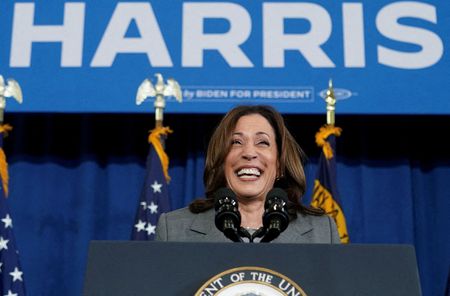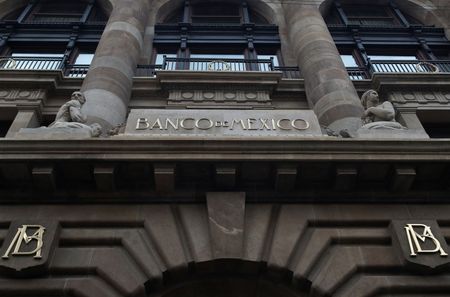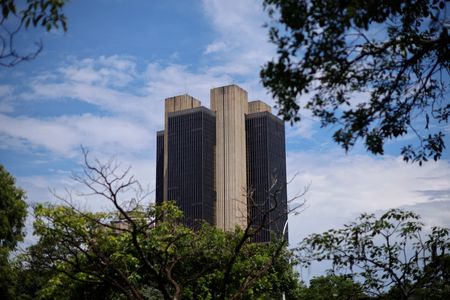By Libby George and Naomi Rovnick
LONDON (Reuters) – Venezuela’s contested election is the latest in a blockbuster year that will see nearly half the world head to the polls.
Races so far have served as a reminder that voters can still deliver surprises to politicians and markets alike.
Here is a selection of the recent, and upcoming, votes and how they are impacting markets.
1.
VENEZUELA
President Nicolas Maduro and his opposition rival both claimed victory in Sunday’s contest.
While electoral authorities said that Maduro had won a third term with 51% of the vote, extending a quarter-century of socialist rule, opposition leaders said their candidate, Edmundo Gonzalez, had won, citing voting tallies they have collected from polling stations.
Protesters and a major international observer have said the vote was undemocratic.
The turmoil sent the debt-defaulted country’s already low bond prices into a new spiral – and dampened investor hopes that for a post-election restructuring.
2. FRANCE
An unexpected election threw a curve ball at markets, focusing attention on political instability in France. The closely-watched French/German bond yield gap briefly hit its widest since 2012 as investors fretted over the nation’s already weak fiscal position.
A surprise left-wing surge in the second-round vote on July 7 blocked a far-right quest for power. But with no single group securing a majority, France faces a hung parliament and policy paralysis.
The left-wing alliance that came first in the election wants to radically change France’s economic course with a tax-and-spending drive, meaning efforts to rein in high debt will likely stall.
2. BRITAIN
Britain’s July 4 election, which delivered big win for the Labour Party, ushers in potential calm after a turbulent period that included 2022’s mini-budget crisis.
Labour must now convince investors its economic growth plans are credible. Markets are giving the new government the benefit of the doubt – sterling is near its highest levels in a year, Britain’s FTSE 250 midcap index is close to two-year highs and has outperformed Europe.
3. MEXICO
The scale of the MORENA party’s win in the June 2 election roiled markets due to the supermajority it gave President-elect Claudia Sheinbaum.
Stocks and the peso currency took a hit in the days following the vote.
Uncertainty around the U.S. election has continued to weigh on the peso – disrupting a popular “carry trade” that seeks to exploit the differences in interest rates between regions.
4.
UNITED STATES
No election looms larger than the Nov. 5 U.S. presidential race. The stakes are high with global trade, funding for Ukraine, defence for Taiwan and the outlook for inflation and rates all potentially impacted.
President Joe Biden’s withdrawal upended a race already marked by an assassination attempt on Republican rival Donald Trump. He and Vice President Kamala Harris, the Democrats’ presumptive nominee, are neck-and-neck in the polls.
If Trump wins, he would likely pursue major policy changes including expansive tariffs. Trump had a big impact on the U.S. dollar in his first term, and a reversal of the strong dollar policy that he has advocated would reverberate globally.
5. SRI LANKA
Sri Lanka will hold a presidential election on Sept. 21, a contest expected to shape future of reforms.
The country defaulted on its debt in 2022 after an economic crisis sparked by heavy borrowing and the COVID-19 pandemic, which led to a plunge in crucial remittances and tourism earnings.
Current president Ranil Wickremesinghe, seen as the most market- and reform-friendly candidate, has overseen a fragile economic recovery, including a pending international debt rework and an IMF bailout.
But poverty, corruption and pain from the reforms could boost his opponents.
6. GHANA
An ongoing economic crisis boosts former president John Dramani Mahama’s chances of defeating ruling party candidate, Vice President Mahamadu Bawumia, in the December election.
The cocoa, gold and oil producer defaulted on most of its external debt in 2022, and secured a $3 billion International Monetary Fund bailout in 2023.
Mahama has said he would try to renegotiate the IMF deal and boost local ownership of future oil and mining projects – moves that could unsettle investors.
Ghana’s cedi has already struggled this year due to the economic strains and faltering cocoa production.
(Additional reporting by Dhara Ranasinghe. Graphics by Rodrigo Campos, Marc Jones and Sumanta Sen; Editing by Angus MacSwan)














